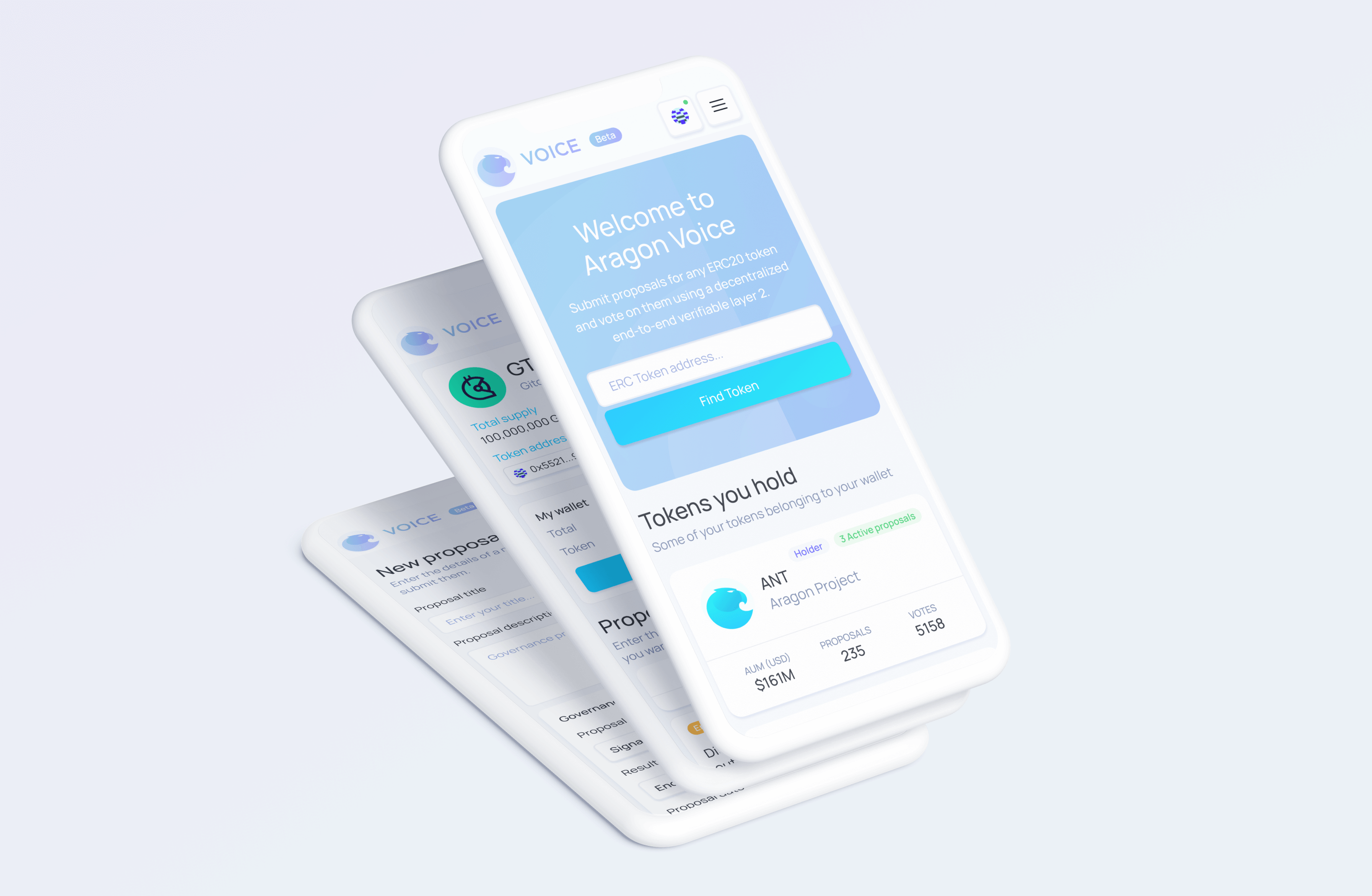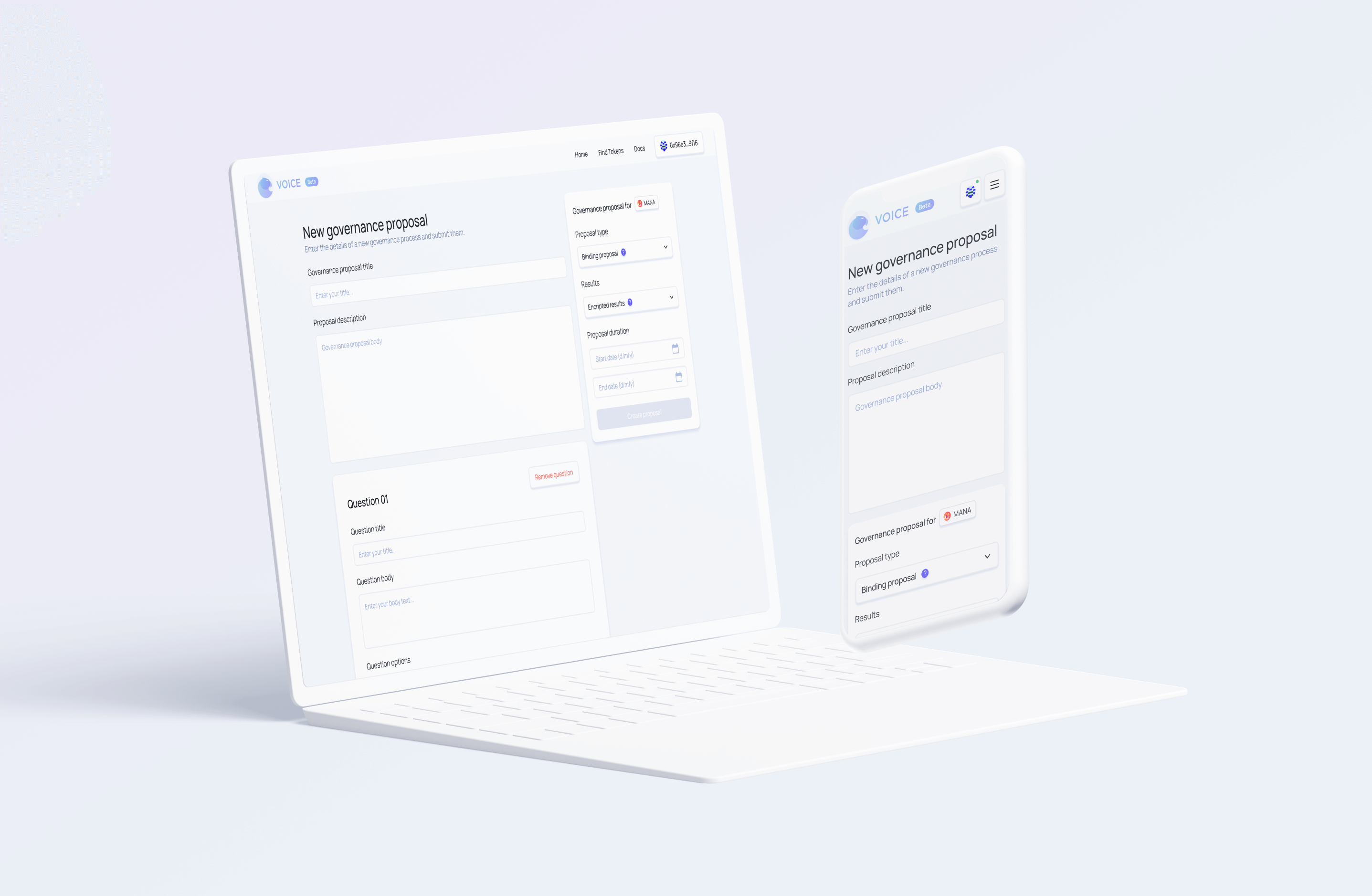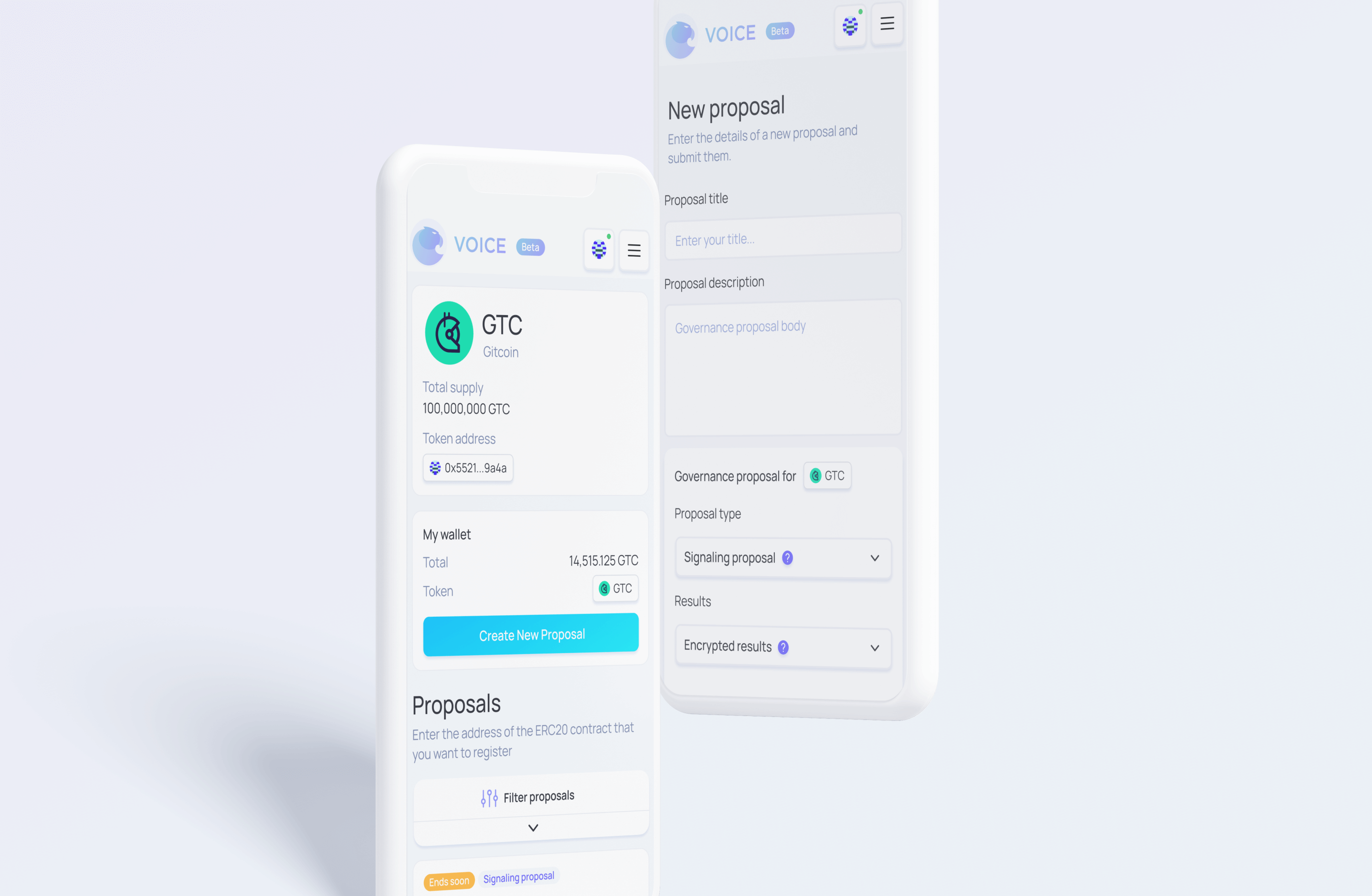Introducing Aragon Voice
We are thrilled to announce that the first instance of the Aragon OpenStack - Aragon Voice - is now live on the Ethereum mainnet.
Aragon

Aragon is at the forefront of the worldwide movement to decentralize power into the hands of Web 3.0 applications and their users. Our open-source infrastructure has so far enabled trustless governance (Aragon Client) and dispute resolution (Aragon Court) on the Ethereum network. To improve the accessibility of these systems, we are rebuilding our entire suite on Aragon v2 OpenStack, removing costly operations off-chain, whilst maintaining as much decentralization as the state of the art enables.
We are thrilled therefore, to announce that the first instance of the Aragon OpenStack - Aragon Voice - is now live on the Ethereum mainnet.

Aragon Voice is a key component of the voting infrastructure we are building for Web 3.0, powering unstoppable decentralized governance with zero voting costs. For the first time ever, anyone with an Ethereum address can design and implement On-Chain Proposals for their ERC20 project, where votes can be cast without gas fees, and are recorded as metadata both to Ethereum and IPFS, or Signaling Proposals that use a centralized backend but are universally verifiable on our custom vote-counting blockchain, Vochain. Only On-Chain Proposal creators need to pay the gas costs of deploying the information to mainnet.
For communities without an ERC20 token, our upcoming release of Aragon Govern will enable anyone to publish a token and assign a governance structure in a matter of minutes, which could then be imported into Aragon Voice.
Being universally verifiable means that from process creation to vote recount, every operation is transparent and can be freely audited by a third party. Voters themselves can also check that their vote has been counted properly using their ballot receipt to query the Vochain explorer.
In this initial beta release, Aragon Voice will be released as a standalone tool before later being integrated into all Decentralized Autonomous Organizations (DAOs) on the Aragon v2 OpenStack along with Aragon Govern and Aragon Court. At this early stage, we see Aragon Voice as being used primarily as a signaling tool for ERC20 tokens including, naturally, our own ANT token. In the future we are planning to extend functionality to other standards, such as ERC721 - the Non-Fungible Token standard - as well as trustlessly binding votes to transaction executions on the Ethereum mainnet.

Built on the Vocdoni OpenStack
To power Aragon Voice, we are using the Vocdoni OpenStack: a fully anonymous voting protocol by design, ensuring data availability and censorship-resistant protocol communication. This technology is also the base for layer-2 (L2), a voting-specific blockchain named Vochain, used for accounting ballots transparently. The protocol can be configured to represent nearly all ballot types, including simple voting, quadratic, weighted, ranked-choice, multiple-choice, plus options such as whether the results are revealed in real-time or locked until the process concludes. Vocdoni’s voting technology has already been used to secure votes of organizations with hundreds of thousands of members, including most recently, a pilot project of digital voting with a survey during the last Catalonia elections.
The Importance of Secure Decentralized Voting
Since humans shifted from nomadic lives to settling in communities, the economic and social structures that have been used to create, transact and store value have been permissioned: centralized power has resided in institutions such as the monarchy, states or church and dictated the distribution of money with horrific consequences for ordinary citizens. Democracy - an experiment of the ancient Greeks - still relies on those centralized parties. We live in an age of smartphones, quantum computing and artificial intelligence, yet, the culture of rapid innovation that produced these marvels has not been allowed to reform the institutions that govern our lives in any meaningful way. Modern governance is not fit-for-purpose.
In 2009, Bitcoin ignited the cryptocurrency revolution and, for the first time, provided humanity with a secure, decentralized and censorship-resistant way to exchange and store value. This removed financial sovereignty away from legacy institutions and back to individuals.
Ethereum took this innovation one step further, making money programmable on the first Turing-complete ‘world computer’. Removed from the constraints of legacy institutions, Ethereum has catalysed the disintermediation of everything, and is making up for lost time by disrupting multiple sectors and industries in parallel: venture capitalism and fundraising with Initial Coin Offerings (ICOs), Initial Decentralized Exchange Offerings (IDOs) and Initial Bonding Curve Offerings (IBCOs); finance with Decentralized Finance (DeFi); content creation with Non-Fungible Tokens (NFTs) and governance with DAOs. Every industry that relies upon centralized institutions to function will be disrupted by this wave of disintermediation.
Today there is more than $50b of value locked in DeFi protocols and this figure is growing exponentially. NFT’s are changing the way creators and content is created, stored, owned and sold. Digital communities are being formed - without borders - incorporated in digital jurisdictions. With the number of participants and amount of locked value increasing, the need for secure, decentralized and permissionless governance tools also increases. To ensure that this renaissance is as inclusive as possible, DeFi needs DeGov.
The Answer to High Fees & Low Participation
In recent months, established communities on the Ethereum network have been struggling with low participation rates because of the high costs of on-chain operations. Self-organizing communities without an ERC20 token must either surrender their data to centralized balloting software or devise their own tamper-proof solution. Together with the upcoming release of Aragon Govern, Aragon Voice is a trustless solution for both groups. Anyone with an idea or concern can onboard their project and publish a proposal in 5 minutes. Although proposals are not yet formally integrated into DAOs and there is no guarantee of participation, Aragon Voice is free to use, meaning that no-one is priced out of participation, and full transparency removes any doubt about the integrity of the ballot, meaning that communities are more likely to view ballots as unbiased and fairly run. This is a virtuous circle: a credibly neutral platform convinces more projects to recognize ballots, which encourages participants that their votes matter, which makes everyone more likely to participate and the more robust the whole process becomes.
Examples of How Aragon Voice Can be Used
With Aragon Voice, even the most humble token holder will be empowered to make a proposal such as changing the exchange fee on a Balancer Pool and directly contribute to the development of their favorite project. Crypto is developing so quickly that no ERC20 project can afford to ignore the individual research conducted by its millions of followers. This ‘wisdom of crowds’ can be distilled quickly and accessibly into thousands of Signaling Proposals, the best of which will gather the most interest and inform the direction of the project leaders.

An example of an On-Chain Proposal would be a DAO aiming to raise money to fund schools in Uganda. At present, the country is politically unstable, making corruption a possibility. There would also be a reputational danger if any development work were given to companies tied to members of the DAO, hurting fundraising efforts. A ballot on the deployment of funds to contractors would have to be demonstrably fair, with only accredited members of the venture taking part. Using Aragon Voice would ensure that only token-holders at the time the proposal was created would have voting rights. As long as each member had publicly claimed their token address beforehand and observers were satisfied that no member was compromised, it would be trivial to audit which addresses had voted in the final tally. In later releases of Aragon Voice, a successful vote can initiate the actual transaction with a delayed execution to allow for any challenges in Aragon Court.
In another example, imagine a group of Amazon warehouse workers who want to create a Signaling Proposal on whether to set up a formal union. Such situations can be highly fractious, with huge social pressure to vote with the majority, especially if the ballot is not anonymous. Still, the legal and practical obstacles to union membership do not affect decentralized, autonomous organisations so the workers could spin up a DAO on Aragon Client (or feelessly on Aragon Govern once released) and distribute tokens to every worker in the warehouse. They would then be able to create an anonymous ballot to lessen peer pressure, which would obfuscate results until every vote had been cast to eliminate any ‘influence bias’. The result would be a highly credible reflection of the workers’ feelings on the matter that would carry weight amongst themselves and with their employer.
Create Your Own Proposal Today
We cannot wait to see the multitude of proposals that will be created. To get things started, we want to invite any holder of ANT tokens to create a proposal that you think would improve Aragon, and see how easy it is for your voice to be heard. Any other ERC20 token holders can head over to voice.aragon.org to onboard your project, see the developer documentation, and get the conversation started with your first proposal. Also feel free to join the technical discussion on Discord, or get in touch via email at support@aragon.org
Subscribe to The Eagle for weekly news on the Aragon Network
